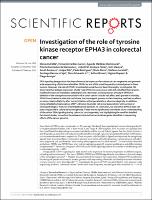| dc.contributor | Vall d'Hebron Barcelona Hospital Campus |
| dc.contributor.author | Andretta, Elena |
| dc.contributor.author | Carton García, Fernando |
| dc.contributor.author | Martinez Barriocanal, Agueda |
| dc.contributor.author | Guimaraes De Marcondes, Priscila |
| dc.contributor.author | Jimenez Flores, Lizbeth Minerva |
| dc.contributor.author | Macaya Erro, Irati |
| dc.contributor.author | Bazzocco, Sarah |
| dc.contributor.author | Gonçalves Rodrigues, Paulo Andre |
| dc.contributor.author | Ramon y Cajal Agüeras, Santiago |
| dc.contributor.author | Schwartz Navarro, Simon |
| dc.contributor.author | Dopeso Gonzalez, J Higinio |
| dc.contributor.author | Arango Corro, Diego |
| dc.contributor.author | Landolfi, Stefania |
| dc.contributor.author | Nieto Raya, Rocio |
| dc.contributor.author | Bilic Zimmermann, Josipa |
| dc.date.accessioned | 2019-03-14T06:58:35Z |
| dc.date.available | 2019-03-14T06:58:35Z |
| dc.date.issued | 2017-02-07 |
| dc.identifier.citation | Andretta E, Cartón-García F, Martínez-Barriocanal Á, de Marcondes PG, Jimenez-Flores LM, Macaya I, et al. Investigation of the role of tyrosine kinase receptor EPHA3 in colorectal cancer. Sci Rep. 2017;7(1):41576. |
| dc.identifier.issn | 2045-2322 |
| dc.identifier.uri | https://hdl.handle.net/11351/3841 |
| dc.description | Tirosina-cinasa; EPHA3; Càncer colorectal |
| dc.language.iso | eng |
| dc.publisher | Nature Research |
| dc.relation.ispartofseries | Scientific Reports;7 |
| dc.rights | Attribution-NonCommercial-NoDerivatives 4.0 International |
| dc.rights.uri | http://creativecommons.org/licenses/by-nc-nd/4.0/ |
| dc.source | Scientia |
| dc.subject | Còlon - Càncer |
| dc.subject | Mucosa intestinal |
| dc.subject | Quinases |
| dc.subject.mesh | Colorectal Neoplasms |
| dc.subject.mesh | /genetics |
| dc.subject.mesh | Intestinal Mucosa |
| dc.subject.mesh | /metabolism |
| dc.subject.mesh | Receptor Protein-Tyrosine Kinases |
| dc.title | Investigation of the role of tyrosine kinase receptor EPHA3 in colorectal cancer |
| dc.type | info:eu-repo/semantics/article |
| dc.identifier.doi | 10.1038/srep41576 |
| dc.subject.decs | neoplasias colorrectales |
| dc.subject.decs | /genética |
| dc.subject.decs | mucosa intestinal |
| dc.subject.decs | /metabolismo |
| dc.subject.decs | receptores proteína-tirosina cinasas |
| dc.relation.publishversion | https://www.nature.com/articles/srep41576 |
| dc.type.version | info:eu-repo/semantics/publishedVersion |
| dc.audience | Professionals |
| dc.contributor.organismes | Institut Català de la Salut |
| dc.contributor.authoraffiliation | [Andretta E, Cartón-García F, Martínez-Barriocanal Á, de Marcondes PG, Jimenez-Flores LM, Macaya I, Bazzocco S, Bilic J, Rodrigues P, Nieto R] Grup de Recerca Biomèdica en Tumors Digestius, Vall d’Hebron Institut de Recerca, Barcelona, Spain. Universitat Autònoma de Barcelona, Barcelona, Spain. [Landolfi S, Ramon Y Cajal S] Servei de Patologia, Hospital Universitari Vall d'Hebron, Barcelona, Spain. [Schwartz S] Grup de Direccionament i Alliberament Farmacològic, Vall d’Hebron Institut de Recerca, Barcelona, Spain. Universitat Autònoma de Barcelona, Barcelona, Spain. CIBER de Bioingeniería, Biomateriales y Nanomedicina (CIBER-BBN), Spain. [Dopeso H, Arango D] Grup de Recerca Biomèdica en Tumors Digestius, Vall d’Hebron Institut de Recerca, Barcelona, Spain. Universitat Autònoma de Barcelona, Barcelona, Spain. |
| dc.identifier.pmid | 28169277 |
| dc.rights.accessrights | info:eu-repo/semantics/openAccess |

 Àrea privada
Àrea privada Contacte
Contacte







